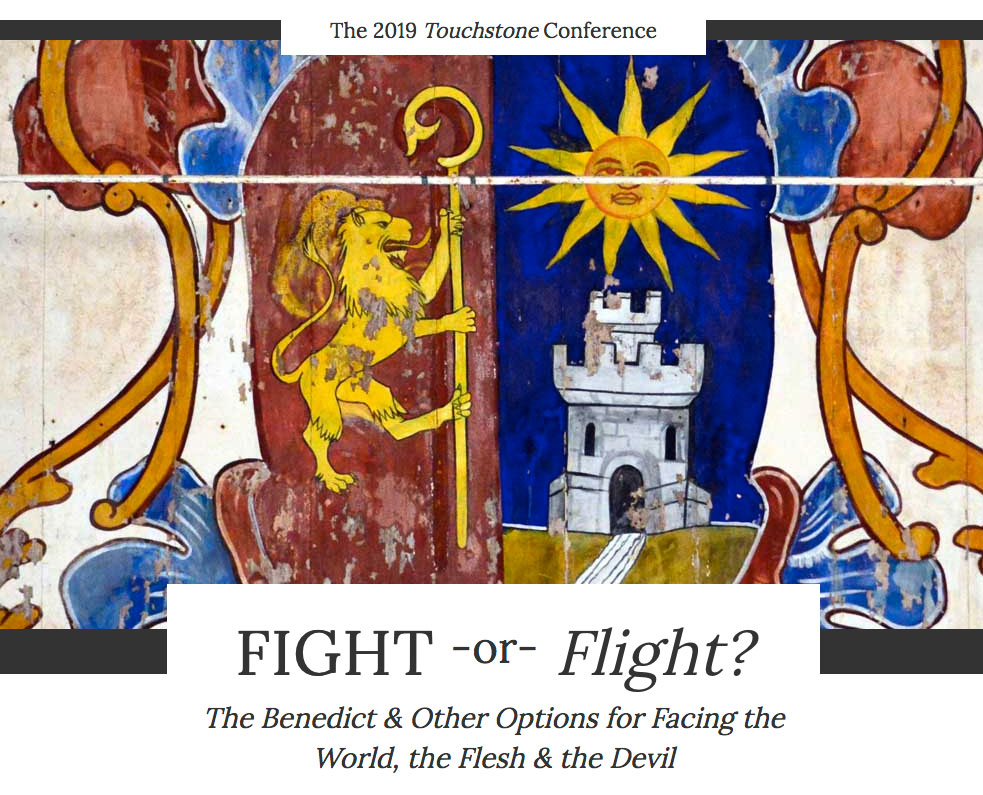Operation Benedict
Are You More Missionary or Monastery?
August 23, 2019

I've been thinking about what introductory remarks I might make to our anticipated audience at the beginning of our conference, Fight or Flight? The Benedict & Other Options for Fighting the World, the Flesh & the Devil. This will be Touchstone's fourth annual conference (details here), October 10-12, 2019.
Rod Dreher will be one of our 12 speakers. His 2017 book, The Benedict Option: A Strategy for Christians in a Post-Christian Nation, became a New York Times bestseller and has drawn international attention, even now translated into (at least) ten languages. Such attention is surely a sign of a crisis in Christendom, of cultural anxiety among the faithful. It's been read and commented on by Protestants, Catholics, and Orthodox. Rod has been invited to speak in many countries about this strategy.
The book has its critics. And the idea behind the book is sometimes misunderstood, oversimplified, and criticized. A criticism, if I had to make one, might be that the subtitle isn't quite right. I don't see a strategy in the sense of a specific blueprint that an individual or a group can follow, like building a house. It presents problems faithful Christians have faced, are facing, and will face in their task of being in the world but not of it. It also presents, with approval, various responses that Christians have made and are making—and the example of Benedict and his legacy.
I think some of the criticism comes from some in the U.S. who had hoped that courts and legislation would be able to stop the tide of moral sludge that has come in, that is, that politics would somehow save us. I must admit that I think less today of the power of political engagement than I did in 2001. Not that there is no power in politics—there is, as we see in new radical legislation against the unborn.
But for many who've been on the front lines of law, politics, public policy, and debate, the book may seem like a call to surrender or retreat from engagement, to even "head for the hills" or go into the cloister (it's not). They fear it will encourage Christians to abstain from voting in massive numbers—although I believe many would now say, "Still vote, but put not your trust in princes"—perhaps a bit more earnestly than before.
For me, the value of The Benedict Option is that it brings to mind the related questions: "What is the priority of the Christian? What is the priority of the Christian congregation? What is the priority of the Church?" You can have only one priority (it's a priority).
Among Touchstone senior editors there also have been critics of the book, though they have sympathies for much of what Rod writes therein. Russell Moore's comment (lifted from Amazon) indicates there is much good to ponder in the book:
"I'm more missionary than monastery, but I think every Christian should read this book. Rod Dreher is brilliant, prophetic, and wise. Even if you don't agree with everything in this book, there are warnings here to heed, and habits here to practice."
Prophetic? Well, Rod did tell a Touchstone conference in 2004 that the gay agenda had already won in the U.S.
I look forward to having Russell at our conference with Rod and Robert George, another critic of the book. I look forward to conversation, debate, and fellowship with fellow Christians coming together on "being in the world but not of it."
What about St. Benedict himself and the monastery? Rod is not calling for universal monasticism (!), but it should be noted that much of the missionary work to the pagans was carried out by monks. The best of them were "anxious about the affairs of the Lord, how to please the Lord" (cf. 1 Cor. 7:32). The Lord is pleased by conversion.
Benedict in his personal withdrawal from Rome and subsequent engagement with the world through the monasteries stands as a symbol of the Church's place —in the world but not of it. The Benedict Option is a strong reminder of a priority for laity, clergy, and monastics.
As to what every individual, parish, and community might do exactly, one size never fits all—unless it is to grow up to the measure of the stature of the fullness of Christ. I think Rod would agree. (We can ask him in seven weeks.)
Come, join our conversation about our life in Christ this October.
Yours for Christ, Creed & Culture,

James M. Kushiner
Executive Director, The Fellowship of St. James
—James M. Kushiner is Executive Editor of Touchstone: A Journal of Mere Christianity, and Executive Director of The Fellowship of St. James.






